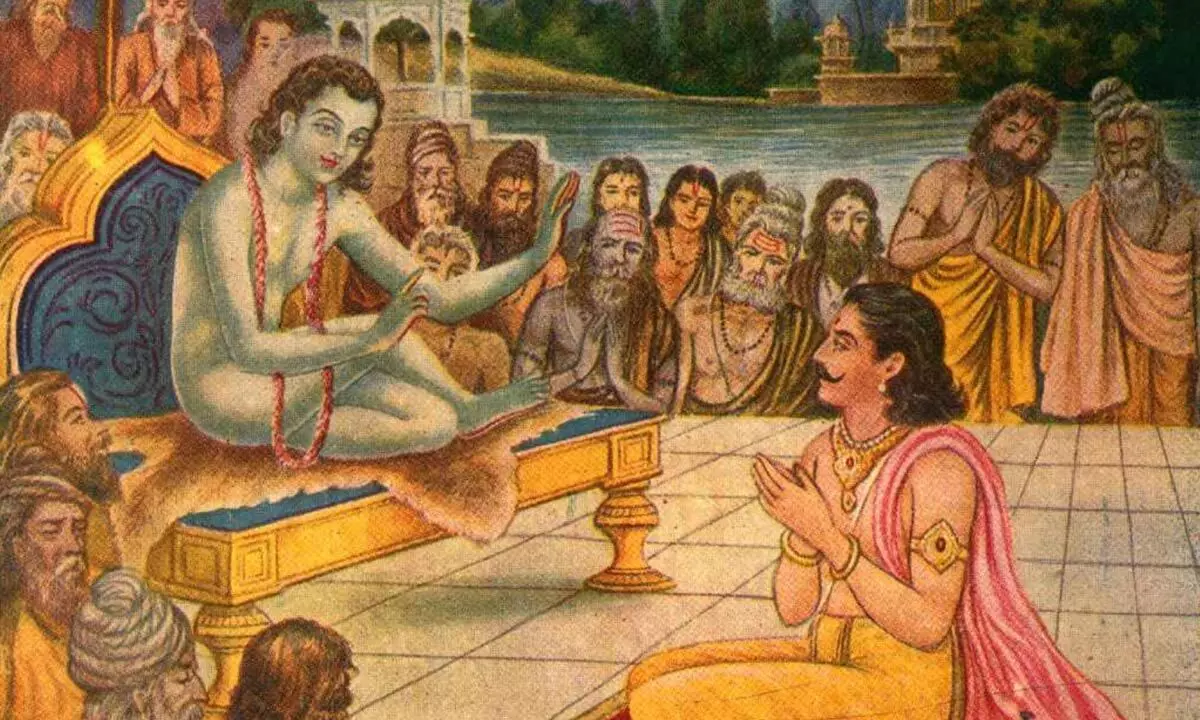Seeing God in All

Seeing God in All
Srimad Bhagavatam contrasts this attachment of Vyasa to his son and the detachment of Suka for the world. Suka had identified himself with Brahman. He had become the self of all beings, and so when Vyasa called out for Suka, the trees echoed ‘Suka’. The message is that Suka had dissolved his individual self into the universal self while Vyasa still had a limited self
Sage Vyasa, the great philosopher, once found himself in a piquant situation. His son, Suka, was endowed with the highest knowledge (of God, called Brahman in Vedanta) since birth. He was not interested in worldly pursuits but moved like a renounced person. He left the house and was wandering in the forests. He did not even care to wear clothes. In fact, he was almost naked, except for a loin cloth.
One day, Vyasa, who had a deep attachment to his son, followed him through a forest and was loudly calling out by name Suka to know where he was. While he was thus following, some divine damsels, known as apsaras, who were bathing in a nearby lake, clothed themselves hurriedly on seeing Vyasa coming that way. A short while earlier, Suka, a young man, went on that path, but the damsels did not bother to clothe themselves.
It was an affront to the wisdom of the grey-haired sage. Sage Vyasa, the enlightened philosopher, was expected to see the universe as a manifestation in Brahman. When Suka passed by, the damsels ignored him, but they put on clothes when the elderly Vyasa came. Vyasa could not restrain and so asked them why they did so. The damsels too told plainly, 'Your eyes still see the distinction between man and woman but your son, who has the ability to see Brahman all around, does not see so.'
Srimad Bhagavatam contrasts this attachment of Vyasa to his son and the detachment of Suka for the world. Suka had identified himself with Brahman. He had become the self of all beings, and so when Vyasa called out for Suka, the trees echoed 'Suka'. The message is that Suka had dissolved his individual self into the universal self while Vyasa still had a limited self.
This is one of several examples of a perfectly enlightened person. This is the benchmark for the sanyasi-s (people who renounce the world and move in ochre robes). Such examples, abundant in our Puranas and books like the Mahabharata, guided the kings and common man as well. The king understood his dharma from a philosophical lens and ruled society. Society worshipped and fed saints held them as role models in personal conduct.
We are fond of using expressions like 'social capital'. However, we can think of a new expression, 'spiritual capital', for the impact of such saints on the collective consciousness of our society.
(The writer is an IPS, Former Director-General of Police united Andhra Pradesh state)









